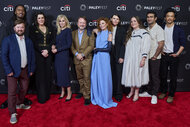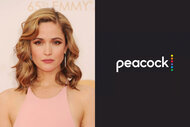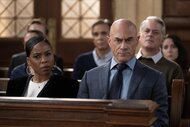Exclusive Interview: Discussing Polyamory with Couple to Throuple Therapist Shamyra Howard
The expert therapist shines light on polyamorous relationships and how it plays into the new show.

Hosted by Scott Evans and guided by sex and relationship expert Shamyra Howard, Peacock’s new Original series Couple to Throuple follows four curious couples through the world of polyamory as they experiment with bringing a third partner into their relationship. A daunting task for anyone, Couple to Throuple helps these couples navigate their new relationships with a daily exercise in couple’s therapy hosted by Howard.
Outside of the show, Howard is a licensed clinical social worker who travels and speaks as a sex educator and has her own private practice, On The Green Couch. We sat down with her to talk about her experiences on Couple to Throuple, the differences between throuples and other forms of nonmonogamy, and how she got started on the show.
To get started, how would you explain polyamorous relationships to someone who isn't familiar with the concept?
Polyamorous relationships fall under the non-monogamy umbrella, which means a person wants to be, or is in a relationship, with more than one person. Polyamory means "many loves," so one person or many people are involved in multiple relationships at the same time. What makes polyamory different from an open relationship is that the practice of polyamory involves being in simultaneous romantic relationships. Open relationships are more about casual dating or casual relationships, no commitment or exclusivity outside of sexual encounters.
Since Couple to Throuple is specifically about throuples versus other forms of polyamorous relationships, what is some guidance that you give to people exploring throupledom?
Couple to Throuple is specifically about the throuple dynamic in polyamory. Throuples get villainized sometimes under the polyamory umbrella because some people only see throuples as an extension of monogamy because often, the throuples or triads are closed, meaning they don't date outside of their triad.
The advice I would give is for couples to first, know your ‘why.’ Why do you want to do this? Because it's very important that you and your partner are on the same page with this. This shouldn't be explored as a remedy for completing a relationship or because you want to prevent cheating, or because someone has cheated.
Polyamory is a real relationship structure — a real relationship dynamic — and that is highlighted in Couple to Throuple because the show is about relationships just as much as it's about polyamory.
So, know your ‘why.’ Have this conversation with your partner and, of course, get some insight. Do your research, read books, talk to reputable couples or reputable practitioners in polyamorous communities, get a polyamorous coach or a sex-positive therapist who's familiar and informed in non-monogamy and polyamory to help guide and help you navigate, and then have a goal. You cannot do any relationship without a goal.
How did you how did you get involved with the show? Did they reach out to you knowing you’re an expert?
They reached out to me about the show because of my online presence and because I specialize in sex and relationships as a certified sex therapist in my practice, On the Green Couch. I have polyamory as one of my specialties that I've received training on, and I work with an abundance of non-monogamous and polyamorous clients.
Dating shows obviously are huge right now. What would you say makes Couple to Throuple special or different?
Well, Couple to Throuple is unlike any other dating show that you've ever seen before. It's an inherently queer show. Every person on the show has some type of queer element to them. It's one of the most diverse shows that you've ever seen. It's also one of the only shows that specifically catered to, or aimed at couples exploring their relationship, and specifically non-monogamous relationships and polyamory.
How did you approach the emotional piece of the process with the cast and couples on the show?
I went into this understanding that most of the couples on the show had no or little experience in non-monogamy or polyamory. I knew a basic idea of what it would be like based on my work with couples who haven't had any experience. I opened myself up to additional possibilities or some that I hadn't had a clue about, and I made sure that I built relationships and rapport with them, so that they all know that I'm there to help them and guide them through the process.
My role was to help bridge that educational and emotional gap between their non-monogamous and monogamous values. Specifically, I was prepared to help the couples to acknowledge and clarify their own values. When we're dealing with people's values as you see in the show, there's going to be huge emotional aspects come up, especially when we're talking about transitioning from one lifestyle and state of being to another one that you have no idea about.
I was also there to help the couples set boundaries with each other and in what they're seeing in another partner, which is hard. My role was also to help them prepare for the emotional components by helping them gauge their chemistry and see the differences between what chemistry versus compatibility looks like for them.
As you see on the "on the same page" episode, some other couples were on the same page when it came to chemistry or who they were looking for, physically. And then as you see the episodes go deeper into the challenges, you’ll see that they get a little bit deeper and more explicit into what they're looking for. Finally, my role was to help them learn how to build connections with another partner, which can be kind of challenging.
What would you say you're most proud of with the show?
Oh, my goodness. Well, first, I'm most proud that the producers and showrunners kept their word to what the show was going to be about. I did not want to be a part of a show that negatively exploits nonmonogamy and polyamorous communities. I was assured and reassured, and then reassured again, that they really wanted to present polyamory in a serious light. They wanted to take polyamorous relationships seriously and wanted me on the show because they knew I would do that. I'm proudest that they actually kept their word about this. Because throuples get such a bad rep in polyamorous communities, I'm proud that people are getting to see what the dynamics look like, the challenges, and even the triumphs of what it would look like to transition from a couple to a throuple.
Since only the first six episodes had been released to the public, what if anything, did you find surprising in the shooting of those episodes?
So, I'll tell you this. What we saw, and what a lot of people had comments on, was the sexual connections and experiences that ensued early in the show. What happened immediately after was a direct effect of boundaries, and people learning what their boundaries are. I was very interested in — and I'm very surprised to see — how quickly people's boundaries kicked in without them even knowing that it was a boundary until we discussed it.
I’m very proud to see how the couples and singles employed their boundaries throughout the series. Throughout the series, you probably won't hear the word "boundary," but you're going to see a lot of boundary-setting because the singles in the show had just the same amount of equity as the couples. My role was to make sure that the relationships were equitable, to teach them how to make the relationships equitable. But you're going to see the singles have just done the same amount of “say so” as the couples, so it was surprising to see how the experience helped to shape people's relational values.
What were you prepared for on the show? What were you expecting versus what occurred on set?
When I came into the show, I didn't know what to expect, so I was very open. This was the first series that I had done. I've done different types of TV, but nothing to this effect. I was eager to get my feel for things to see how it works, how or what to expect, or how it would go. I did think that this was a dating show that was going to provide more education and support with all the things that reality shows do, or reality dating shows do, to couples wanting to explore polyamory. However, I was not shocked, but happy to see some of the relational values and things that the couples and singles gained. Also, I was happy to see what they unlearned from participating in this process.
Watch Couple to Throuple on Peacock.


















